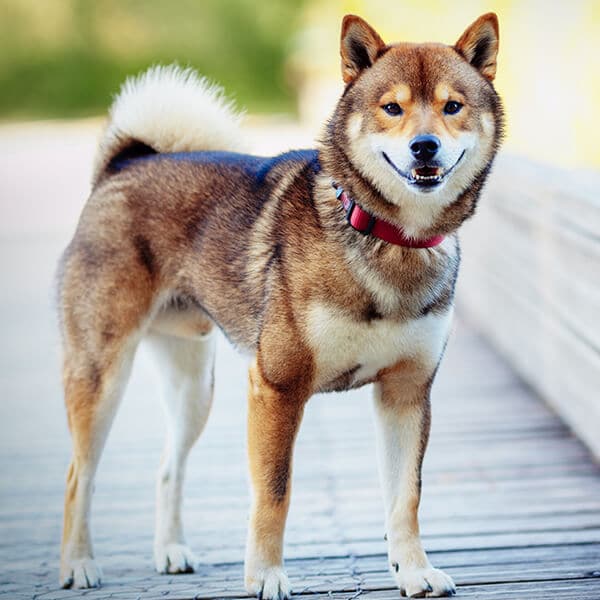Shiba Inu Food and Health
The Shiba Inu is a hardy breed, with excellent genetic heritage. As a result of minimal tampering with cross-breeding, these dogs have a well-balanced structure. Shibas are athletic and flexible, with the ability to sprint and jump with ease. Shibas like to stand erect on their hind legs. They maintain their balance perfectly, while they look up to roofs, treetops, or the dog treat you’re holding.
Common hereditary health issues affecting Shibas in their later years include vision issues, like glaucoma and cataracts. They may also be more inclined to develop structural problems, such as hip dysplasia and patellar luxation.
Shibas have a sharp mind. Unfortunately, this makes them challenging to train as they have an independent character. Studies of the breed show that Shibas may be prone to anxiety issues related to separation and noise.
The dogs don’t like to be alone for extended periods of time. They may whine or “cry,” if unattended or left outside in the evening. Shibas have sensitive hearing. They exhibit anxiety to loud noises, such as thunder, gun-shot, or firecrackers. This anxiety may create an urge to flee from the source of the sound.
Shiba Inu Nutrition
Shibas require a diet of fresh, nutritious dog food. They are generally picky eaters. Unless spoiled as puppies, they don’t wolf down their food. They may turn back and look at you if they don’t like what you add to their bowl such as fun feeder slow Feed dog bowl.
Due to their hunting nature, these dogs are prone to eating things they find on the ground. You will need to keep a close eye on them while out for a walk. If they separate from you in a forest, you may find them gnawing on the carcass of a dead bird or small animal. They may also try to eat items, such as fast-food chicken bones, that they discover in their path.
Shibas have sensitive gastrointestinal systems. Avoid feeding them commercially-produced kibble. The ingredients may create allergic reactions. Many commercial dog food producers use feed-grade ingredients in their products. The toxins generate skin and fur issues with Shibas.
As puppies, Shibas need to establish good eating habits. Overfeeding a puppy may turn them into a greedy dog that develops weight issues. Overweight Shibas are less active and will experience shorter lifespans.
As a puppy, them a diet that’s 80-percent protein, 10-percent fibrous vegetables, and 10-percent whole grains. Adjust their food if you find your puppy has loose stool. Increase the fiber content of their meals to 30-percent vegetables and grains.
Excellent protein sources for Shibas include; fresh free-range chicken, and grass-fed beef, as well as fatty fish like salmon or tuna. Limit carbohydrates to whole-grain sources and never feed them refined carbs like pasta.
A balanced diet will ensure the excellent health of your Shiba into their senior years. This breed does not require any specific changes in diet between their adolescent and senior years. Unless they develop poor eating habits in their formative years, Shibas typically remain moderate eaters.
Purchase your Shiba a small feeding bowl for their puppy phase. Change it to a medium-size bowl at 12 to 18-months. This medium-size bowl should suffice for the rest of their life.
Shiba Inu Insurance
Less than 1-percent of all dogs in the United States have health insurance. Considering the benefits, it’s a surprising statistic. Insuring the health of your Shiba is a smart idea. This breed is active. Accidents can happen while they’re playing in the park or running a trial in the woods.
Shibas are exotic. Therefore, they are at higher risk of exposure to disease, and the development of auto-immune disorders. The most common health risks associated with the breed involve their gastrointestinal system. Drinking or eating tainted water or food in their local environment, is the most frequently cited reason for premature death in Shibas.
Other common GI disorders include ulcers and diverticulitis. Shibas are overly-sensitive to parasite infections such as tapeworm, whipworm, and roundworm.
Shibas require regular health checkups for their hips and eyes, especially as they reach their senior years. Therefore, it’s a prudent strategy to insure the health of your dog. The average insurance premium is only $35 per month.
Insurance for your Shiba ensures that you aren’t left with a hefty vet bill if something goes wrong. Shibas don’t get along with other dogs. If your Shiba escapes your sight at the local park and meets another dog, they’re likely to get into a fight.
Being that they have a strong, independent nature, they won’t back down to a challenge. His means they have a high risk of injury. Insuring your Shiba could save you thousands on vet bills, and their life.

